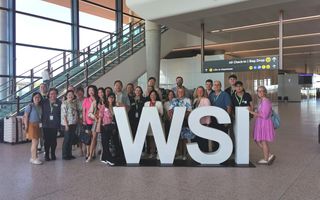A new report has highlighted sustainability, authentic experiences, ‘gig tripping’ and AI as the key trends fuelling booming growth in the travel sector.
Continued economic growth in emerging markets, especially in Asia Pacific, is also boosting visitation.
According to the 2025 World Travel Market Global Travel Report, released this week during travel and tourism event WTM London, the travel industry is set to grow at a faster pace than the global economy over the next 10 years.
Research was conducted by Tourism Economics, an Oxford Economics company and a leading global economic forecaster and provider of quantitative analysis.
The report said: “Over the next decade, the industry is on track to post annual growth of 3.5%, surpassing global economic growth of 2.5 per cent per year over the same period.”
By 2035, the travel industry is expected to generate more than $16 trillion globally, representing nearly 12% of global GDP.
These optimistic projections come as the global travel industry reached record levels in 2025, with international arrivals set to top 1.5 billion, surpassing the previous record achieved in 2019.
Consumers are prioritising their spending on travel, which remains a high share of overall expenditure, despite increasing costs in many parts of the world.
Furthermore, people are increasingly buying experiences rather than material items and live events are a key driver in this sector.
The report said: “Destinations are actively encouraging major touring artists to host events in their cities following the successes of a series of high-profile concerts, including Taylor Swift’s Eras Tour – attended by more than 10 million people – and Oasis’ Live ’25 Tour, which is set to attract nearly two million fans across 13 countries in 2025.”
The quest for culturally rich offerings, including meeting locals and sampling regional food and drink, is causing the industry to focus to reshape its operations, with more focus on handcrafted experiences and storytelling.
“Today’s travellers are increasingly seeking more unique experiences and authentic engagement with local communities,” the report said.
“This is also causing other shifts in behavior as more travellers pursue less crowded destinations, with shifts in seasonality in some parts of the world.”
According to UN Tourism, Environmental, Social, and Governance (ESG) considerations are now essential for the tourism sector, where businesses are deeply connected to the environment and local communities.
ESG affects everything from customer loyalty and biodiversity protection to risk management, sustainable financing and investor relations.
Sustainability key to NSW visitor economy growth
Sustainability and resilience are integral to the future of NSW’s visitor economy, driving global demand for responsible travel and preserving NSW’s natural and cultural heritage.
Actions outlined in the NSW Visitor Economy Strategy 2035 include:
- Promote green aviation: Drive Sustainable Aviation Fuel (SAF) adoption by incentivising local production, expanding SAF infrastructure and partnerships with airlines to reduce aviation emissions.
- Accelerate carbon neutrality: Support visitor economy businesses with renewable energy adoption, carbonneutral certification and waste reduction practices.
- Foster regenerative tourism: Develop conservation projects and eco-tourism experiences in partnership with visitor economy stakeholders and Aboriginal communities.
Learn more about the NSW Visitor Economy Strategy 2025 here.



